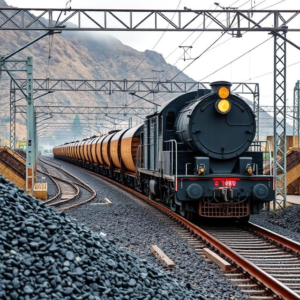Role of Railways in India’s Export Economy
Indian Railways plays a crucial role in boosting India’s export economy by providing a reliable and cost-effective way to transport goods for export. Let’s break it down step by step:

1. How Indian Railways Supports the Transportation of Goods for Export:
- Efficient and Reliable Transport: Indian Railways provides a fast, safe, and cost-effective way to transport goods to ports where they can be exported internationally. Since railways cover large distances and are more reliable compared to other transport options (like road transport), they help in moving goods efficiently to ports such as Mumbai, Kolkata, Chennai, and others.
- Dedicated Freight Corridors: To support exports, Indian Railways has established dedicated freight corridors—special tracks meant just for freight (goods) transport. These corridors connect important production hubs to ports, reducing delays and increasing the speed of transport. This makes it easier to move goods in bulk from factories to ships.
- Bulk and Specialized Goods Transport: Railways help transport large volumes of goods that are needed for export. They can handle goods in bulk, such as coal, minerals, textiles, agricultural products, etc., and have specialized trains for perishable goods (like fruits and vegetables) or heavy machinery.
2. Key Export Commodities Transported via Indian Railways:
- Agricultural Products: India exports a wide variety of agricultural goods, such as spices, grains, rice, and fruits (like mangoes). Railways transport these products to ports for shipment. For example, wheat, rice, and tea are commonly moved by rail.
- Industrial Goods and Raw Materials: Railways also play a key role in transporting industrial goods like steel, cement, and machinery that are needed for export. These goods often require large-scale, bulk transportation, making rail the best option.
- Minerals and Coal: India is one of the largest producers of coal and minerals. These are exported to countries around the world, and the railways are crucial for transporting these bulk commodities from mining areas to ports.
- Textiles and Garments: India is a major exporter of textiles and clothing. Railways help in transporting ready-made garments from factories to ports for international export, supporting India’s role as a leading textile exporter.
- Electronics and Automobiles: India also exports electronics and automobiles. Railways help move finished products and parts to ports where they are shipped internationally.
3. Impact of Rail Connectivity on Boosting India’s Global Trade:
- Improved Access to Global Markets: With better rail connectivity, India can transport goods faster and more efficiently to seaports, making it easier to access global markets. This helps in reducing lead times (the time it takes to move goods from factories to ships), which is crucial for competing in international markets.
- Cost-Effective Transportation: Railways are much cheaper than road transport for long-distance transportation, especially for bulk goods. Lower transportation costs make Indian products more affordable on the international market, boosting India’s exports.
- Connecting Remote Areas to Global Markets: Railways help connect remote and rural areas (where raw materials and agricultural products are grown) to major ports. This means that even small-scale producers can export their goods efficiently, improving India’s trade with other countries.
- Boosting Export Volumes: Efficient railway systems encourage more businesses to engage in export activities because they can be sure that their goods will reach ports quickly and safely. This leads to an increase in the volume of goods that India exports, which in turn boosts the country’s overall trade figures.
- Attracting Foreign Investment: With a well-connected railway network, India becomes an attractive destination for foreign companies that want to set up manufacturing plants. These companies know that they can rely on railways to move their goods to ports efficiently, making India an even more important player in global trade.
In Summary:
Indian Railways plays a vital role in supporting India’s export economy by offering efficient, cost-effective transportation of goods across the country. From agricultural products to textiles, coal, and electronics, railways ensure that key export commodities reach international markets quickly. With improved rail connectivity to ports, India can boost its global trade, lowering transport costs, speeding up shipments, and connecting even the most remote regions to the world. This makes railways an essential part of India’s economic growth and export success.
Keywords: Indian Railway, Railway











